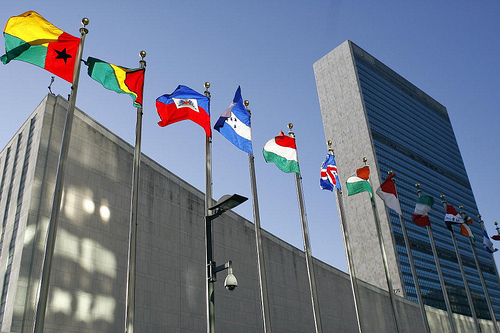 U.N. headquarters: Site of all the inaction.Photo: United NationsThe U.S. was given a starring role at the United Nations Climate Summit on Tuesday, but China stole the show.
U.N. headquarters: Site of all the inaction.Photo: United NationsThe U.S. was given a starring role at the United Nations Climate Summit on Tuesday, but China stole the show.
President Barack Obama had pride of place on the agenda, as the first head of state to speak to the gathered world leaders, ministers, and climate negotiators. His speech, which was warmly received, offered rhetorically forceful yet wholly general commentary about the huge risks posed by climate change and the need for action. Obama said nothing specific about what his nation was prepared to commit to in order to slash its emissions of heat-trapping greenhouse gases. Most of the speeches by other heads of state charted the same safe territory.
Chinese President Hu Jintao, on the other hand, vowed that China would curb the growth of its greenhouse-gas emissions by a “notable margin” from 2005 levels by 2020. He said his nation would generate 15 percent of its power from renewables and nuclear by 2020, and plant 150,000 square miles of new forest over that same period. He also committed to improving energy efficiency and integrating climate action into domestic economic development plans.
While Hu avoided talk of specific emissions reductions and stressed that developed countries should do more than their developing counterparts, his statements were the most definitive to date about what China is prepared to do to cut and compensate for its carbon emissions.
Al Gore hailed Hu’s speech. “I think that China has provided impressive leadership,” Gore said.
Humberto Rosa, Portugal’s secretary of state for environment, echoed that sentiment. “China has today given a little bit of leadership” among the developing nations “by giving solid numbers,” Rosa said.
Gore, Rosa, and others had similar praise for Japan’s new prime minister, Yukio Hatoyama, who has pledged that his nation will cut emissions 25 percent from 1990 levels by 2020.
These new commitments from Asia’s powerhouses are putting real pressure on the U.S., as is the European Union’s willingness to commit to cuts of 80 percent below 1990 levels by 2050 if the U.S. will follow suit.
Meanwhile, small island nations — some of whose very existence is threatened by climate change — are also putting on all the pressure they can.
This past summer, the world’s major economies announced a goal of keeping overall surface warming of the Earth by 2100 to less than 2 degrees Celsius (3.8 degrees Fahrenheit) above pre-industrial temperatures. The Alliance of Small Island States (AOSIS) has challenged the global community [PDF] to keep overall surface warming well below 1.5 degrees C, which would mean even greater cuts than the most ambitious treaty proposals made so far.
A treaty that settles for anything less would spell disaster for island nations, in the view of Dean Bialek, U.N. representative for the nonprofit group Independent Diplomat, who is advising and assisting the AOSIS nations in the climate treaty negotiations. “[It] would mean complete inundation and statelessness,” says Bialek. “That’s a morally repugnant outcome, and totally unacceptable.”
But despite China, despite Japan, despite the European Union, most observers agree that it will all come down to what the U.S. is prepared to do. “A firm commitment from the U.S. would make the dominoes fall into place,” Bialek says.
“With the change in administration in the U.S., everyone believed that a strong deal was forthcoming,” Bialek continued. “Hopes have dimmed a bit due to the mixed signals coming from Washington.”
Portugal’s Rosa says the E.U. still trusts that President Obama wants to fight global warming, but worries that America’s domestic political process could derail this year’s international treaty talks.
“The American people and the Senate are the real actors now,” Rosa says. “We’re sure the United States will get there, but we’ll be sorry if it’s not in time for Copenhagen.”




